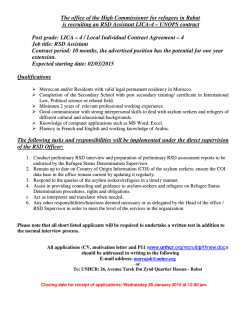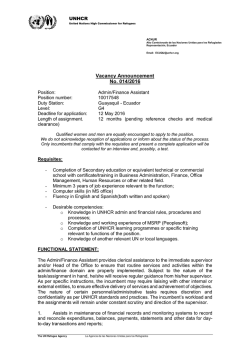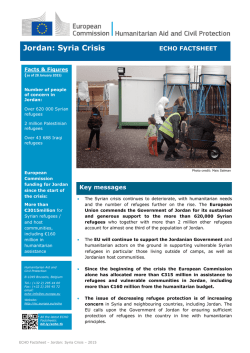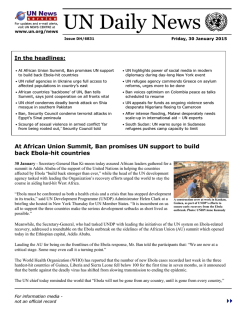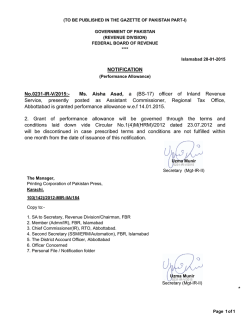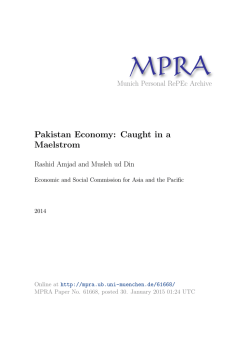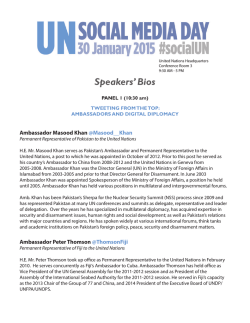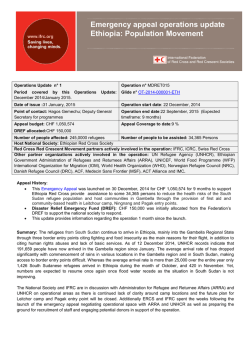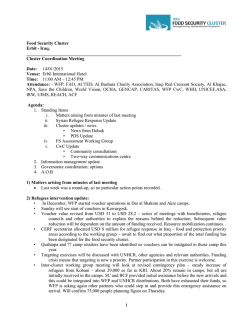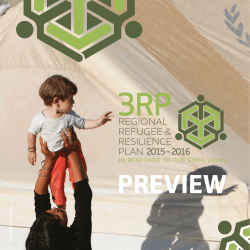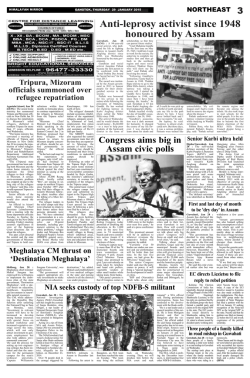
Download PDF (925.22 KB)
PAKISTAN GLOBAL APPEAL 2015 UPDATE | Overview | Planned presence Number of offices 3 Total personnel 271 International staff 41 National staff Working environment 212 JPOs 2 Others 16 z Pakistan hosts almost 1.5 million registered Afghan refugees – still the largest protracted refugee population globally. Since 2002, UNHCR has facilitated the return of 3.8 million registered Afghans from Pakistan. z Efforts to address the needs of Afghan refugees and their host communities, and to advance durable solutions, are undertaken within the framework of the regional Solutions Strategy for Afghan Refugees (SSAR), the tripartite agreement on voluntary repatriation, and the Government of Pakistan’s national policy on Afghan refugees. 2015 plan at a glance* 2.4 million People of concern (PoC) USD 137.1 million Overall funding requirements 96,000 Registered children targeted for enrolment in primary education 1,800 Refugees estimated to depart for resettlement countries * All PoC figures refer to projected 2015 end-year information at time of planning (mid-2014) | z To complement UNHCR and partners’ international support, the Government of Pakistan has extended Afghan refugees’ Proof of Registration (PoR) cards until the end of 2015, issued birth certificates for 800,000 Afghan refugee children, provided land for several refugee villages, and given refugees access to public schools and health clinics. z In August 2014, there were 714,548 registered internally displaced people (IDPs) in need of humanitarian assistance due to the ongoing security operations in the Federally Administered Tribal Areas (FATA) and Khyber Pakhtunkhwa. The North Waziristan emergency has further displaced approximately 500,000 people. UNHCR Global Appeal 2015 Update • Pakistan • 1 | z The operating environment for humanitarian actors in Pakistan remains volatile, with fragile security, as well as access, social and economic challenges likely to affect humanitarian operations. In order to improve outreach to populations of concern and to build local capacity, UNHCR works closely with local partners and government counterparts. People of concern The main groups of people of concern planned for in 2015 under the Pakistan operation include: Afghan refugees, of whom approximately one-third live in refugee villages, and two-thirds in urban and rural host communities; some 7,000 asylum-seekers and individually-recognized refugees from various countries (mostly Afghans), living mainly in urban areas; IDPs, including those relocated by military operations and ethnic/religious conflicts in FATA, and, since the beginning of military operations in June 2014, IDPs from North Waziristan; and three groups presumed to be stateless or at risk of statelessness in Pakistan, namely Bengalis and Biharis, as well as Rohingyas from Myanmar. Planning figures Type of population Origin Jan 2015 1,468,250 1,478,030 1,478,030 60 60 80 80 Somalia 400 400 500 500 Various 140 140 180 180 5,290 5,290 6,270 6,270 Islamic Rep. of Iran 20 20 30 30 Somalia 50 50 60 60 Various 40 40 40 40 Iraq Afghanistan Asylum-seekers Of whom assisted by UNHCR Total in country 1,468,250 Afghanistan Refugees Dec 2015 Of whom assisted by UNHCR Total in country Internally displaced Pakistan 566,900 566,900 590,900 590,900 Returnee arrivals during year (ex-IDPs) Pakistan 270,600 270,600 276,000 276,000 2,311,750 2,311,750 2,352,080 2,352,080 Total | Response | Needs and strategies UNHCR’s activities in Pakistan take place within a complex context, facing serious challenges as a result of the frequency of conflict and emergencies. component of the in-country implementation of the SSAR, UNHCR will enhance asylum space and support both host communities and refugees. In 2015, UNHCR will support the Government in the implementation of the regional SSAR through the country-specific portfolio of projects developed in 2014, advance efforts to mobilize resources for prioritized activities, and assist in implementing the national policy on Afghan refugees, achieving the potential for durable solutions (voluntary repatriation and resettlement). Through the Refugee Affected and Hosting Areas (RAHA) initiative, which is an integral Resettlement will be used strategically to protect refugees at risk. From UNHCR’s perspective, increased resettlement is also important to preserve asylum space in Pakistan. | The organization will continue promoting a favourable protection environment for Afghan refugees. It will advocate Pakistan’s accession to the 1951 Convention relating to the Status of Refugees and its adoption of UNHCR Global Appeal 2015 Update • Pakistan • 2 | national refugee legislation drafted in 2013. UNHCR will also advocate the extension of Afghan refugees’ legal status and corresponding PoR cards beyond December 2015. For asylum-seekers and individually-recognized refugees, UNHCR will continue to conduct registration and mandate refugee status determination, to ensure access to asylum in the absence of government procedures, and to support resettlement. Support for IDPs includes maintaining IDP camps and protecting their rights including by supporting the Government’s registration processes, legal aid/civil documentation support, and monitoring. UNHCR will encourage the Government to adopt an IDP policy that conforms to international standards. UNHCR will continue to lead humanitarian efforts focused on protection, shelter and camp coordination/camp management during the complex emergency as part of a UN inter-agency response. A five-year transition strategy will gradually consolidate and prioritize UNHCR’s assistance to the most vulnerable Afghan refugees in coordination with the Government through various models of health-service delivery. Based on a statelessness study conducted in 2014, UNHCR will, with relevant government counterparts, identify possible solutions and ensure that concerned populations can exercise their basic human rights and access services. Main objectives and targets for 2015 The following matrix contains examples of some of the main activities planned in 2015. Using a selection of objectives from UNHCR’s programme plans for the 2014-2015 biennium, it is designed to illustrate: what - under the global needs assessment planning and prioritization process - has been planned (Planned activities) for particular groups of people of concern (People of concern); the identified needs that can be covered if full and flexible funding is made available (2015 comprehensive target); and the needs that may not be met if funding falls short of the ExCom-approved budget (Potential gap). The estimation of a potential gap is based on the country operation’s own assessment of the likely impact of a global funding shortfall. Calculations are based on various criteria, including the particular context, Planned activities strategic priorities and experience of resource availability for the respective area of activity in previous years. Activities under objectives on child protection (including best interest determination), education and prevention and response to sexual and genderbased violence (SGBV) are core areas which are given priority in the allocation of funding (priority area). In order to ensure the necessary flexibility in the allocation of funds, UNHCR relies on unrestricted contributions from its donors. It should be understood that in some cases, targets for activities or delivery of services may not be reached for reasons other than a funding shortfall, e.g. lack of access to people of concern, cases not reported, changing circumstances, security problems, insufficient capacity to implement all programmes planned, etc. In the Global Report 2015, an explanation of why any target may not have been reached will be provided. People of concern (PoC) 2015 comprehensive target Potential gap DURABLE SOLUTIONS Comprehensive solution strategy developed, strengthened and updated In line with the SSAR and the Government’s national policy on Afghan refugees, adopted in July 2013, UNHCR will work towards achieving comprehensive solutions (voluntary repatriation and resettlement) for Afghan refugees. Historically, Afghan refugees have been well accepted within the local community due to cultural and ethnic similarities. Nevertheless, the gradual deterioration of the socio-economic environment is adversely affecting this peaceful coexistence. Through the RAHA initiative, UNHCR works to enhance asylum space and provide support to host communities and refugees. It plans to implement up to 56 projects to improve social cohesion among refugees and hosting communities. Extent to which comprehensive solutions strategy implemented and monitored | Refugees and asylum-seekers UNHCR Global Appeal 2015 Update • Pakistan • 3 100% | 0 gap Planned activities People of concern (PoC) 2015 comprehensive target Potential gap Potential for voluntary return realized UNHCR will support the Government in respecting the principles of a voluntary, safe and dignified return. The organization will continue operating voluntary repatriation centres to facilitate this return process and will support the return task force and national authorities to ensure the return process respects international standards. UNHCR will also assist returning IDPs using information campaigns and by providing adequate support. Number of PoC reached by mass information campaigns Number of PoC receiving return package Refugees and asylum-seekers 1,000,000 200,000 IDPs 216,000 66,000 FAVOURABLE PROTECTION ENVIRONMENT Access to legal assistance and remedies provided At the beginning of 2015, all registered Afghan refugees will be in possession of renewed PoR cards. However, the post-transition period in Afghanistan and its potential implications on the security environment in Pakistan, are likely to result in increased vulnerability of Afghan refugees. Therefore, UNHCR will focus on protection activities, in particular to prevent unlawful arrest, detention and refoulement, and on advocacy on preserving asylum space including a further extension of the validity of the PoR cards. UNHCR will also facilitate PoR card modification to reflect changes in family composition and PoR card replacements, and assist in obtaining birth certificates. As a pilot country for UNHCR’s strategies on sexual and gender-based violence (SGBV) prevention and response, the Office will continue focusing on capacity building, enhancing partnerships, and establishing referral pathways. It will also enhance community sensitization and awareness to increase the SGBV reporting rate which is very low due to cultural stigma. Number of PoC receiving legal assistance Refugees and asylum-seekers 15,000 3,000 IDPs 100,000 0 gap BASIC NEEDS AND ESSENTIAL SERVICES Population has access to optimal education As Pakistan is a pilot operation for UNHCR’s Global Education Strategy for 2012–2016, improving refugees’ access to public education institutions remains key. UNHCR will continue to provide free primary education to approximately 96,000 refugee children in refugee villages through 174 schools, 53 satellite classes and 18 home-based girl schools. It will provide classroom supplies and salaries for 1,726 teachers, support the maintenance and rehabilitation of schools, campaign for enrolment and fewer drop outs, particularly of girls, and support Balochistan’s four community-based secondary schools. Teacher training will improve the quality of education and efforts will be made to recruit female teachers. Greater scholarship opportunities will increase access to secondary and tertiary education. UNHCR will continue advocating the inclusion of refugee children in Pakistani public schools. Number of children enrolled in primary education Refugees and asylum-seekers 96,000 priority area Extent to which strategy to promote admission of PoC to national education system established Refugees and asylum-seekers 100% 0 gap COMMUNITY EMPOWERMENT AND SELF-RELIANCE Peaceful coexistence with local communities promoted Historically, Afghan refugees have been well accepted within the local community due to cultural and ethnic similarities. The gradually deteriorating socio-economic environment is having an adverse effect on the peaceful coexistence of the two communities. UNHCR plans to implement up to 56 projects under the RAHA initiative to improve social cohesion among refugees and hosting communities. Number of projects benefitting local and displaced communities implemented Refugees and asylum-seekers 56 50 | Implementation | Coordination Close coordination and interaction with key government counterparts, at federal and provincial levels, will be enhanced. This includes engagement with: the Ministry of States and Frontier Regions, the Chief Commissioner for Afghan Refugees (CCAR), the National Database and Registration Authority, the Ministry of Interior, the Ministry of Foreign Affairs, the Ministry of Refugees and Repatriation, the Commissionerates for Afghan Refugees (CARs), the Provincial Disaster Management Authorities, the FATA Disaster Management Authority and relevant line ministries. | UNHCR will build synergies with other stakeholders in: the care and maintenance assistance provided to refugees by national programmes, the RAHA initiative, and the wider involvement of One-UN interventions. The organization will continue promoting the SSAR as an enabling, multilateral platform for building consensus, strengthening existing partnerships and engaging new actors. UNHCR will encourage UNICEF, UNFPA, WHO, the Government and other operational partners to explore further possibilities for joint interventions. UNHCR Global Appeal 2015 Update • Pakistan • 4 | | Financial information | Partners Implementing partners Government agencies: Afghan Refugees and Repatriation Cell (Karachi); FATA Disaster Management Authority; Government of Pakistan – CAR Balochistan; Government of Pakistan – CCAR, Islamabad; Government of Pakistan – CAR Khyber Pakhtunkhwa; Government of Pakistan – CAR Punjab; Khyber Teaching Hospital; Ministry of Refugees and Repatriation, Refugee Attaché Office Peshawar; Ministry of Refugees and Repatriation, Refugee Attaché Office of the Embassy of the Islamic Republic of Afghanistan, National Database and Registration Authority, Government of Pakistan; Provincial Disaster Management Authority NGOs: In 2015, the comprehensive needs for the Pakistan operation are estimated at USD 137.1 million – USD 10.4 million less than the 2014 revised budget. Of the 2015 budget, USD 58.8 million is allocated for the refugee programme, USD 28.4 million for the protection and assistance of conflict IDPs, and USD 49.6 million for development projects aimed at the peaceful coexistence of refugees and host communities. The recent IDP influx from North Waziristan (June 2014) has led to the establishment of a supplementary budget of USD 16.2 million for 2014. Budgets for Pakistan | 2010–2015 ACTED; Al Falah Development Foundation; Alisei – Italy; American Refugee Committee; Awaz Welfare Organization; Azat Foundation; Balochistan Rural Development and Research Society; Basic Education and Employable Skills Training; Basic Education for Afghan Refugees; Catholic Relief Services, United States Conference of Catholic Bishops – USA; Centre of Excellence for Rural Development; Church World Service – USA; Council for Community Development; Courage Development Foundation; Danish Refugee Council; Dost Welfare Foundation; Drugs and Narcotics Educational Services for Humanity; Education, Health, Social Awareness and Rehabilitation; EHSAR foundation; Foundation for Rural Development; Gender and Reproductive Health Organization; Helping Organization for People’s Empowerment; Hujra Village Support Organization; Human Development Organization Doaba; Initiative for Development and Empowerment Axis; Innovative Development Organization; Inspire Pakistan; International Catholic Migration Commission; International Rescue Committee – USA; Legend Society; Muslim Aid; National Integrated Development Association – Pakistan; Naveed Khan Foundation; Norwegian Refugee Council; Organization for Community Services and Development; Pakistan Community Development Programme; Regional Institute of Policy Research and Training; Salik Development Foundation; Sarhad Rural Support Programme; Save the Children Federation; Society for Community Support to Primary Education; Society for Empowering Human Resources; Society for Humanitarian Assistance, Research, Empowerment and Development; Society for Humanitarian Rights and Prisoners ; Socio Pakistan; Struggle for Change – Pakistan; Tamer-e-Khalq Foundation, Taraqee Foundation – Pakistan; Frontier Primary Health Care – Pakistan; Union Aid for Afghan Refugees – Pakistan; Water, Environment and Sanitation Society – Pakistan; Women Empowerment Organization Others: UNOPS Operational partners Government Agencies: Ministry of Education, Ministry of Foreign Affairs, Ministry of Health, Ministry of Human Rights, Ministry of the Interior, Ministry of Social Welfare, Ministry of States and Frontier Regions NGOs: Norwegian Refugee Council Others: FAO, ICRC, ILO, UNDP, UNESCO, UNFPA, UN HABITAT, UNICEF, UNV, UN WOMEN, WFP, WHO | UNHCR Global Appeal 2015 Update • Pakistan • 5 | 2015 budget for Pakistan | USD Budget breakdown 2014 revised budget (as of 30 June 2014) PILLAR 1 PILLAR 2 PILLAR 3 PILLAR 4 Refugee programme Stateless programme Reintegration projects IDP projects 57,863,794 160,420 60,849,014 Total 28,616,056 147,489,285 Favourable protection environment Law and policy Access to legal assistance and remedies Access to territory and refoulement risk reduced Public attitude towards people of concern Subtotal 289,903 304,241 0 0 594,143 2,495,757 0 0 614,008 3,109,765 529,922 0 0 0 529,922 731,338 0 0 0 731,338 4,046,919 304,241 0 614,008 4,965,167 2,303,825 0 0 1,102,077 3,405,902 881,038 0 0 0 881,038 Fair protection processes and documentation Registration and profiling Status determination procedures 1,184,903 0 0 0 1,184,903 4,369,765 0 0 1,102,077 5,471,843 Prevention and response to SGBV 2,830,649 0 0 0 2,830,649 Protection of children 1,314,612 0 0 0 1,314,612 4,145,261 0 0 0 4,145,261 10,143,275 0 7,941,259 0 18,084,534 Individual documentation Subtotal Security from violence and exploitation Subtotal Basic needs and essential services Health 414,019 0 0 0 414,019 Water 3,668,122 0 9,621,259 0 13,289,380 Sanitation and hygiene Nutrition 2,988,038 0 5,081,259 0 8,069,296 Shelter and infrastructure 0 0 0 10,689,232 10,689,232 Basic and domestic items 474,019 0 0 2,442,655 2,916,674 Education Subtotal 9,566,675 0 8,901,259 0 18,467,934 27,254,148 0 31,545,034 13,131,887 71,931,069 2,963,038 0 0 436,508 3,399,546 0 0 5,981,259 0 5,981,259 3,588,922 0 5,981,259 174,431 9,744,611 6,551,959 0 11,962,517 610,939 19,125,415 Community empowerment and self-reliance Community mobilization Coexistence with local communities Self-reliance and livelihood activities Subtotal Durable solutions Comprehensive solutions strategy 2,474,019 0 4,059,759 0 6,533,777 Voluntary return 4,715,978 0 0 10,104,463 14,820,441 2,036,941 0 0 0 2,036,941 9,226,938 0 4,059,759 10,104,463 23,391,159 Coordination and partnerships 0 0 0 164,431 164,431 Camp management and coordination 0 0 0 1,242,577 1,242,577 793,941 0 0 427,939 1,221,879 793,941 0 0 1,834,947 2,628,887 1,194,825 0 0 434,431 1,629,255 Resettlement Subtotal Leadership, coordination and partnerships Donor relations and resource mobilization Subtotal Logistics and operations support Logistics and supply 1,250,843 0 2,046,307 549,423 3,846,574 Subtotal 2,445,668 0 2,046,307 983,853 5,475,829 2015 total budget 58,834,599 304,241 49,613,617 28,382,173 137,134,630 Operations management, coordination and support | UNHCR Global Appeal 2015 Update • Pakistan • 6 |
© Copyright 2026
